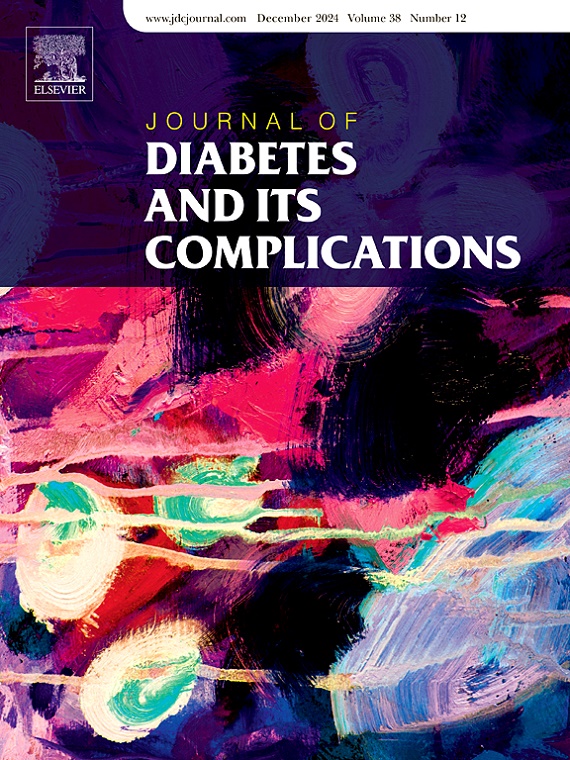Dietary factors and cancer outcomes in individuals with type 2 diabetes: A systematic review and meta-analysis of prospective observational studies
IF 3.1
3区 医学
Q3 ENDOCRINOLOGY & METABOLISM
引用次数: 0
Abstract
Introduction
Cancer is a major health concern in persons with type 2 diabetes (T2D). Diet plays an important role in progression of diabetes and cancer. We aimed to systematically summarize the evidence on diet and cancer in individuals with T2D.
Methods
PubMed and Web of Science were searched until August 2023 and followed up via PubMed alert until December 2024. Prospective studies investigating any dietary factor in association with cancer in individuals with T2D were eligible.
Results
We identified 68 studies and conducted 20 meta-analyses. A general low-carbohydrate diet was not associated with cancer outcomes, whereas an inverse association was found for vegetable-based low-carbohydrate diet (HR per 5 points [95 % CI]: 0.90 [0.84, 0.97]; n = 2). We found indications of lower cancer incidence for higher adherence to Dietary Approaches to Stop Hypertension diet, (Alternate) Healthy Eating Index, higher intakes of n-3 fatty acids (0.73 [0.55, 0.98]; n = 2) and higher serum vitamin D (0.95 [0.93, 0.97]; n = 2), as well as a positive association for serum manganese concentrations (1.44 [1.11, 1.87]; n = 2), rated with low to very low certainty of evidence.
Conclusion
So far, the certainty of evidence is very limited due to the small numbers of primary studies. There is an indication of a possible association between diet and cancer risk among persons with T2D, but further well-designed prospective cohort studies are warranted.
2型糖尿病患者的饮食因素和癌症结局:前瞻性观察性研究的系统回顾和荟萃分析
癌症是2型糖尿病(T2D)患者的主要健康问题。饮食在糖尿病和癌症的发展中起着重要作用。我们的目的是系统地总结糖尿病患者饮食和癌症的证据。方法检索PubMed和Web of Science至2023年8月,通过PubMed alert进行随访至2024年12月。在t2dm患者中调查任何与癌症相关的饮食因素的前瞻性研究是合格的。结果我们确定了68项研究,并进行了20项荟萃分析。一般低碳水化合物饮食与癌症结局无关,而以蔬菜为基础的低碳水化合物饮食与癌症结局呈负相关(每5点的风险比[95% CI]: 0.90 [0.84, 0.97];n = 2)。我们发现,高依从性饮食方法来停止高血压饮食、(替代)健康饮食指数、高n-3脂肪酸摄入量可以降低癌症发病率(0.73 [0.55,0.98];n = 2)和较高的血清维生素D (0.95 [0.93, 0.97];N = 2),以及与血清锰浓度呈正相关(1.44 [1.11,1.87];N = 2),证据确定性为低至极低。到目前为止,由于初步研究的数量较少,证据的确定性非常有限。有迹象表明t2dm患者的饮食与癌症风险之间可能存在关联,但需要进一步精心设计的前瞻性队列研究。
本文章由计算机程序翻译,如有差异,请以英文原文为准。
求助全文
约1分钟内获得全文
求助全文
来源期刊

Journal of diabetes and its complications
医学-内分泌学与代谢
CiteScore
5.90
自引率
3.30%
发文量
153
审稿时长
16 days
期刊介绍:
Journal of Diabetes and Its Complications (JDC) is a journal for health care practitioners and researchers, that publishes original research about the pathogenesis, diagnosis and management of diabetes mellitus and its complications. JDC also publishes articles on physiological and molecular aspects of glucose homeostasis.
The primary purpose of JDC is to act as a source of information usable by diabetes practitioners and researchers to increase their knowledge about mechanisms of diabetes and complications development, and promote better management of people with diabetes who are at risk for those complications.
Manuscripts submitted to JDC can report any aspect of basic, translational or clinical research as well as epidemiology. Topics can range broadly from early prediabetes to late-stage complicated diabetes. Topics relevant to basic/translational reports include pancreatic islet dysfunction and insulin resistance, altered adipose tissue function in diabetes, altered neuronal control of glucose homeostasis and mechanisms of drug action. Topics relevant to diabetic complications include diabetic retinopathy, neuropathy and nephropathy; peripheral vascular disease and coronary heart disease; gastrointestinal disorders, renal failure and impotence; and hypertension and hyperlipidemia.
 求助内容:
求助内容: 应助结果提醒方式:
应助结果提醒方式:


